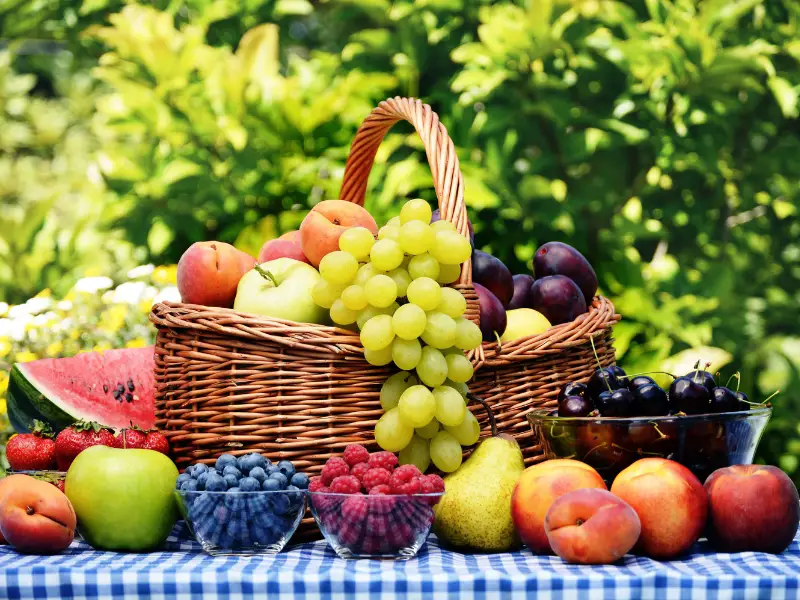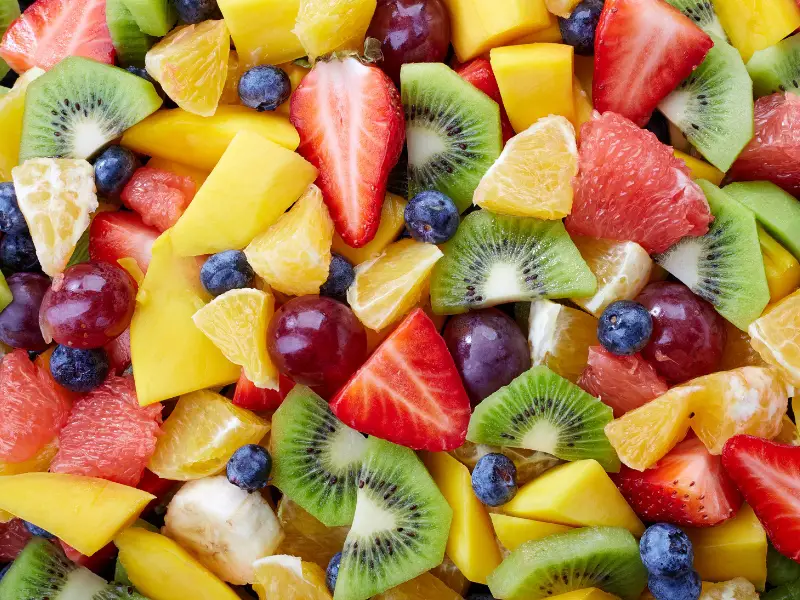Rabbits are herbivores, which means that their primary diet is made up of plants. While hay and fresh vegetables are essential for their health, many rabbit owners wonder whether it is safe to feed their pets fruit. The answer is yes, rabbits can eat fruit, but it should be given in moderation.
Fruits are a good source of vitamins and minerals that are essential for a rabbit’s health. However, they also contain a high amount of sugar, which can cause digestive problems if given in excess. It is recommended to limit the amount of fruit given to rabbits to one or two small pieces per day.
When introducing fruit to a rabbit’s diet, it is important to start with small quantities and monitor their reaction. Some fruits, such as grapes and raisins, can be toxic to rabbits in large amounts. It is also important to wash the fruit thoroughly and remove any seeds or pits that may be harmful to the rabbit. By following these guidelines, rabbits can safely enjoy the occasional piece of fruit as a treat.
Are Fruits Good for Rabbits?
Rabbits are known for their love of carrots, but can they also eat fruits? The answer is yes but with some caution. Fruits can be a great source of vitamins and minerals for rabbits, but they can also be high in sugar and can cause digestive problems if given in excess.
When feeding fruits to rabbits, it is important to remember that they should only be given as a treat and not as a staple food. A rabbit’s diet should consist mainly of hay, fresh vegetables, and a small amount of pellets. Fruits should only be given in small amounts, no more than one or two tablespoons per day.
Some of the best fruits for rabbits include apples, bananas, berries, and melons. These fruits are low in sugar and high in fiber, making them easy for rabbits to digest. However, it is important to remove any seeds or pits from the fruit before feeding it to your rabbit, as these can be harmful to their digestive system.
On the other hand, there are also some fruits that should be avoided when feeding rabbits. These include grapes, raisins, and citrus fruits, as they are high in sugar and can cause digestive problems. Additionally, fruits that are high in calcium such as kiwi and mango should also be avoided, as they can lead to bladder stones in rabbits.
In conclusion, fruits can be a great addition to a rabbit’s diet in moderation. They can provide important vitamins and minerals, but should only be given as a treat and in small amounts. It is important to choose the right fruits and avoid those that are high in sugar or calcium.
What Fruits Can Rabbits Eat?

Rabbits love to munch on fruits, but not all fruits are safe for them. Some fruits can cause digestive problems and even be toxic to rabbits. Therefore, it is important to know which fruits are safe for your furry friend.
Here are some fruits that rabbits can safely eat:
1. Apples
Apples are a great source of vitamins and fiber for rabbits. They are also low in calories, making them a healthy snack option. However, make sure to remove the seeds and core before giving them to your rabbit as they can be harmful.
2. Bananas
Bananas are a good source of potassium and fiber. They are also high in sugar, so it is important to feed them to your rabbit in moderation.
3. Berries
Berries such as strawberries, raspberries, and blueberries are good sources of vitamin C and antioxidants. They are also low in calories and high in fiber, making them a healthy snack option for rabbits.
4. Grapes
Grapes are a good source of vitamins and antioxidants. However, they are high in sugar, so it is important to feed them to your rabbit in moderation.
5. Melons
Melons such as watermelon and cantaloupe are a good source of vitamins and fiber. They are also low in calories, making them a healthy snack option for rabbits. However, make sure to remove the seeds and rind before giving them to your rabbit.
In conclusion, rabbits can safely eat a variety of fruits, but it is important to feed them in moderation and remove any harmful parts. Always consult with your veterinarian before introducing new foods to your rabbit’s diet.
What Fruits Can Rabbits Not Eat?
While rabbits can eat a variety of fruits, some fruits can be harmful to them. Here are some fruits that rabbits should avoid:
1. Grapes and Raisins
Grapes and raisins are toxic to rabbits and can cause kidney failure. Even a small amount of grapes or raisins can be harmful to rabbits. If your rabbit accidentally eats grapes or raisins, it’s important to seek veterinary care immediately.
2. Citrus Fruits
Citrus fruits such as oranges, lemons, and grapefruits can cause digestive upset in rabbits. These fruits are high in acid and can cause stomach discomfort, diarrhea, and vomiting.
3. Avocado
Avocado contains persin, which is toxic to rabbits and can cause respiratory distress, heart failure, and death. Even a small amount of avocado can be harmful to rabbits.
4. Rhubarb
Rhubarb contains oxalic acid, which can be toxic to rabbits. Eating rhubarb can cause kidney damage, seizures, and even death.
5. Fruit Seeds and Pits
Fruit seeds and pits, such as those found in apples, cherries, and peaches, can be dangerous to rabbits. These seeds and pits can cause choking, blockages in the digestive tract, and cyanide poisoning.
In conclusion, while rabbits can safely eat many fruits, it’s important to avoid feeding them grapes, raisins, citrus fruits, avocados, rhubarb, and fruit seeds and pits. If you’re unsure about whether a particular fruit is safe for your rabbit to eat, it’s always best to consult with a veterinarian.
What is the Rabbit Diet Consist of?
Rabbits are herbivores and require a diet that is high in fiber, low in fat, and rich in nutrients. In the wild, rabbits primarily feed on grass, hay, and leafy greens. A healthy rabbit diet should consist of the following:
1. Hay
Hay is an essential part of a rabbit’s diet. It provides the necessary fiber that is required for healthy digestion. Timothy hay is the most commonly recommended type of hay for rabbits, but other types of hay such as orchard grass, oat hay, and brome hay can also be fed.
2. Vegetables
Vegetables are an important source of vitamins and minerals for rabbits. Leafy greens such as kale, parsley, and spinach are good choices. However, vegetables that are high in sugar such as carrots and fruits should be given in moderation.
3. Pellets
Pellets are a concentrated source of nutrition that can be used to supplement a rabbit’s diet. Pellets should be high in fiber and low in fat. A good quality pellet should contain at least 18% fiber.
4. Water
Water is essential for a rabbit’s health. Fresh, clean water should be available at all times. Rabbits can drink from a water bottle or a bowl.
In summary, a healthy rabbit diet should consist of hay, vegetables, pellets, and water. It is important to provide a variety of foods to ensure that your rabbit receives all of the necessary nutrients.
How much fruit should a rabbit eat a day?
Rabbits enjoy eating fruits as much as humans do. However, it is important to note that fruits should not make up a significant portion of a rabbit’s diet. Fruits are high in natural sugars and can cause digestive issues if consumed in excess.
According to the House Rabbit Society, a rabbit’s diet should consist of 80% hay, 10% fresh vegetables, and 5% fresh fruits. This means that fruits should be limited to small amounts as a treat or occasional addition to their diet.
A general guideline for the amount of fruit a rabbit can consume per day is 1-2 tablespoons per 2 pounds of body weight. For example, a 4-pound rabbit can have 2-4 tablespoons of fruit per day.
It is important to introduce fruits slowly and in small amounts to avoid upsetting a rabbit’s digestive system. It is also important to remove any uneaten fruit from their enclosure to prevent spoilage and attracting flies.
Some safe fruits for rabbits to consume in moderation include apples, bananas, blueberries, strawberries, and raspberries. Always wash fruits thoroughly before feeding them to a rabbit and remove any seeds or pits that may be harmful.
In summary, while fruits can be a tasty addition to a rabbit’s diet, they should be limited to small amounts and introduced slowly to avoid digestive issues.
Related Articles:

